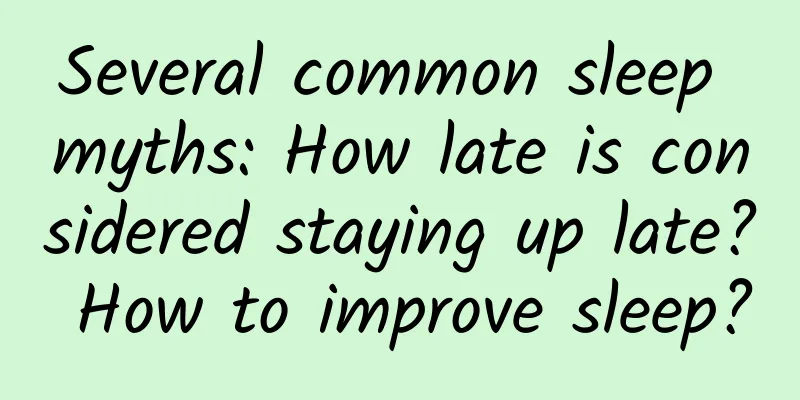Several common sleep myths: How late is considered staying up late? How to improve sleep?

|
Today we will talk about sleep issues that are highly relevant to everyone. What are the dangers of poor sleep? What counts as staying up late? Does snoring mean you are sleeping well? Is the longer the nap, the better? These questions are answered for you. How many of these symptoms of staying up late do you have? Time is precious at night, I want to be alone and quiet, time slips away unknowingly; I work hard during the day and don’t have time to apply a facial mask, so I have to be beautiful at night; They are drifting away from entertainment activities and are becoming addicted to watching TV series and short videos; Lack of emotional communication, people are just holding their phones and checking Weibo and Moments. What are sleep disorders? In China, more than 300 million people suffer from sleep disorders, three-quarters of whom fall asleep after 11 p.m., and nearly one-third fall asleep after 1 a.m. Sleep disorders refer to the disorder of sleep quantity, quality, time and rhythm. Factors affecting the "quality" of sleep include snoring and abnormal limb movements (long light sleep time); factors affecting the "quantity" of sleep include insomnia and hypersomnia (short effective sleep time). What are the dangers of poor sleep? Long-term lack of sleep will lead to various psychological and physical illnesses. Common problems include: depression, anxiety, obesity, Alzheimer's disease, osteoporosis, type 2 diabetes, cardiovascular and cerebrovascular diseases, etc. How late is considered staying up late? Studies have shown that there is no exact time for staying up late. As long as you don’t go to bed at the same time every day, it will affect your resting heart rate, which is equivalent to staying up late. If we have to mention a specific time point, from the perspective of biological rhythm and endocrine, it is generally considered staying up late if you go to bed after 11pm. Sleeping longer does not mean sleeping better Many people believe in the "8-hour sleep theory", but in fact, it is more important to get 4-5 sleep cycles. What is a sleep cycle? When a person is sleeping normally, there are two periods: "non-rapid eye movement sleep" and "rapid eye movement sleep". The two alternate, and each alternation is called a sleep cycle. Each cycle is about 90-110 minutes. Some misconceptions about sleep If you have trouble getting up in the morning, set more alarms. Waking up and falling asleep again and again can easily lead to a sleep-wake cycle, making it difficult to fully wake up. This may cause chronic fatigue. It is recommended that you get up all at once after the alarm rings. Snoring = sound sleep? Severe snoring can cause repeated breathing pauses during sleep, leading to various diseases and even sudden death, and should be treated promptly. The longer your nap, the more energetic you will be? The ideal nap time is 15-30 minutes. If it is too long, it will cause dizziness and general fatigue. What is a good sleep? Fall asleep quickly: usually within 30 minutes. Adequate sleep time: The average daily sleep time for different groups of people is 10-12 hours (children), 9-10 hours (teenagers), 7-8 hours (adults), and 5-6 hours (elderly people). Excellent quality: It is not easy to wake up at night, and you can fall asleep quickly after waking up; there are no disturbing dreams during sleep, and the dreams are quickly forgotten after waking up; you rarely stay in bed, and you can wake up naturally without an alarm clock; you will be full of energy in the morning without feeling tired. Five ways to improve your sleep quality Go to bed early and get up early, keep a regular schedule Have a relatively fixed sleeping and waking time. The best sleeping time is from 10 pm to 6 am. If it is not necessary, do not stay up late. Keep exercising to improve sleep Moderate exercise during the day is a major driving force for improving nighttime sleep, such as aerobic exercises such as walking, boxing, gymnastics, jogging, combined with limb stretching and strength training. Eat three meals regularly and don’t eat too late Don't eat too much before going to bed. A large amount of food digested in the stomach will constantly stimulate the brain and make it difficult to fall asleep. There should be at least 3 hours between dinner and sleep. Don't drink tea, alcohol or coffee before going to bed. Improve the environment and create a sleeping atmosphere Maintain ideal temperature, sound and light in the bedroom, with the temperature preferably between 20-23°C. Turn off the headlights before going to bed and minimize light and noise. Relieve stress and relax Try to keep your body and mind calm before going to bed. You can choose to read a book or listen to soothing music. Avoid looking at your phone or watching videos before going to bed. There are thousands of things to do for health, and sleep is the most important. I wish everyone can have a good sleep. |
<<: Searching for “MOSS” in the real world (Part 3): The “first front” in the quantum computing race
Recommend
Baidu search account setup process!
A good account structure, like a solid foundation...
The latest guide to APP listing in 2021
After the APP is developed, the final operation i...
Several ways to draw circular pictures in Android
There are often some requirements in development,...
How to find 100 Internet startup projects?
Solution: Let me share with you 10 methods to dis...
First concentrated appearance! How many amazing archaeological discoveries are there in the Mausoleum of Qin Shihuang?
2024 marks the 50th anniversary of the archaeolog...
Are children's respiratory diseases at high risk again? Expert response →
Since the start of school in September, as childr...
Xiaohongshu’s efficient strategies for increasing followers!
In just one or two months during the epidemic, th...
AARRR model | 4 key points to attract new users!
High-quality new customer acquisition is insepara...
The disappearance of "it"! If your presbyopia suddenly disappears, it may not be a good thing
Everyone is familiar with "presbyopia",...
Case analysis of Toutiao information flow advertising
Based on our actual promotion situation, the effe...
Recommended product selections for second-tier direct-sale e-commerce businesses!
Which products are hot-selling in Category II e-c...
The Self-cultivation of a "Bartender"
Let’s first look at this question: There is a cla...
Dongfeng Yipai and Yu Fei’s “friends”, what is the significance of such live shows?
"Dongfeng Yipai and Yu Fei's "frien...
Interaction, performance, scene, copywriting, the core of operation is to make it happen naturally
This article uses the actual experience of "...
Using QQ groups to explore user cold start growth
Some people may think that not many people use QQ...









